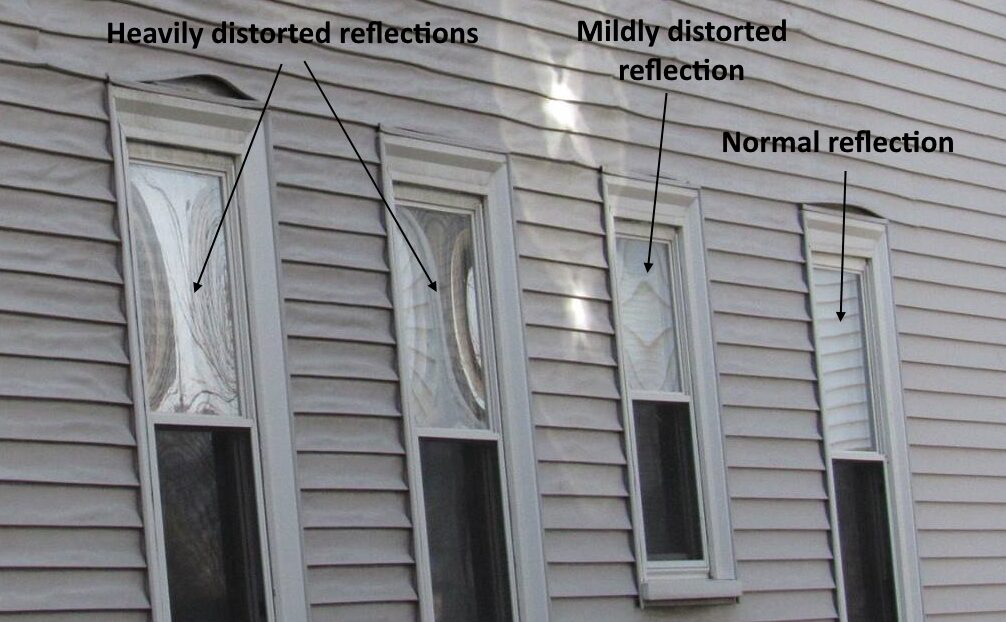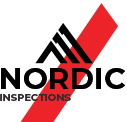
Windows are essential not only for aesthetics and natural light but also for insulation and energy efficiency. One lesser-known issue that property owners occasionally encounter is what’s called “collapsed glass.” If you’ve ever seen a window that looks distorted, bowed inward, or has strange reflections, you might be dealing with this very issue.
In this post, we’ll explain what collapsed glass is, how it happens, and what you can do to fix it.
What is Collapsed Glass?
Collapsed glass refers to a condition in insulated glass units (IGUs)—commonly known as double- or triple-pane windows—where one or more panes appear sucked inward or bowed, creating visual distortion. This happens when there’s a significant pressure imbalance between the air sealed inside the glass unit and the outside atmosphere.
IGUs are built with two or more glass panes sealed around the edges with a spacer. The gap between the panes is filled with air or inert gases (like argon or krypton) to provide thermal insulation. When that sealed environment is disrupted, it can lead to the “collapsing” effect.
What Causes Collapsed Glass?
Here are the most common causes:
1. Atmospheric Pressure Changes
If the IGU was manufactured or sealed at a much higher altitude than where it was installed, the air inside the unit has higher pressure. When the unit is moved to a lower elevation (with higher external pressure), the outer pressure can “crush” the window slightly inward.
2. Temperature Fluctuations
Significant changes in outdoor temperature can cause the gas inside the IGU to contract. If the sealed unit can’t expand or equalize the pressure, it can collapse inward.
3. Seal Failure and Gas Leakage
When the seal around the IGU fails, the insulating gas can leak out, and moisture or air can enter. This leads to pressure changes that cause one or both panes to bend inward or outward.
4. Manufacturing Defects
Sometimes, the issue stems from poor quality control during production—like improper gas fill levels or poor edge sealing.
How to Identify Collapsed Glass
Here are a few signs you might be dealing with collapsed glass:
- The center of the glass appears concave or bowed inward.
- There’s distortion or warping in reflections (objects may look bent or wavy).
- Condensation or fogging between panes (may indicate seal failure).
- Windows may feel colder than usual or allow drafts.
Can You Fix Collapsed Glass?
Unfortunately, once a glass unit collapses, it can’t be repaired in the traditional sense. However, there are several options depending on the severity and your budget:
Replace the Insulated Glass Unit (IGU)
This is the most common solution. If the frame is still in good condition, you don’t have to replace the entire window—just the glass unit itself. A professional can remove the failed IGU and install a new, properly sealed one.
Full Window Replacement
In cases where the window frame is also compromised or outdated, a full replacement might be the better long-term solution, especially for energy efficiency and aesthetics.
Preventative Options
If you’re building or remodeling, ask your contractor about:
- Using altitude-adjusted or pressure-equalized IGUs.
- Choosing high-quality manufacturers that test their seals and fill levels.
- Installing capillary tubes (in some designs) that allow slow equalization of pressure.
Why You Should Address Collapsed Glass
While it may not seem like a structural issue at first, collapsed glass compromises your home’s energy efficiency, comfort, and appearance. It can lead to:
- Higher energy bills
- Reduced insulation
- Moisture damage if seal failure allows condensation
- Lower property value
Final Thoughts
Collapsed glass is a clear sign that your window’s insulated seal has failed or is under pressure imbalance. While it’s not always an emergency, it’s definitely something to address sooner rather than later to preserve your home’s comfort and efficiency.
If you suspect a collapsed window or have concerns about your home’s windows, our inspection team can help. We’ll assess the condition and provide clear recommendations so you can make informed decisions about repair or replacement.
If you have any questions, contact Nordic at 701.566.1446 ext. 0!
